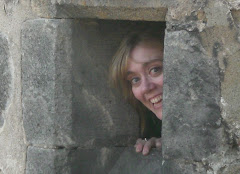Hakani has shown signs of not developing as other children do, and because of her handicaps, she is deemed soulless. If she had been born a twin or a triplet, or the was the child of a single mother, her fate would have been the same – she was to be buried alive so that her last breath would be underground and then the evil spirit could not escape.
But Hakani’s parents have too much love for her, and take their own lives before they are forced to take hers. But, what is most tragic is that their sacrifice steals not only their own lives, but leaves Hakani and the lives of her other siblings unprotected.

The responsibility of doing “duty” now falls to the eldest brother, so he buries her alive…only to have someone rescue her and put her into someone else’s hands.
But not all is easy. The tribe will not take her back in, deeming her as cursed, and after another attempt on her life, the 2 ½ years old is abandoned in the jungle, left to scrounge for food and receiving as much help as one of her brothers, Bibi, can give. After three years, Bibi is finally able to take her from the jungle and make the long journey down the river to a missionary outpost to get help for his sister.
It is there that Hakani, age 5 ½ and weighing only 15 pounds, begins her journey towards a different life. These missionaries take her in, get her treatment for her massive physical and mental malnourishments, and begin to watch her grow. Her life is valuable, and at 12 years old today, she is a vibrant and lively girl.
(Picture: Hakani today)
 But what of the other children whose voices are never heard?
But what of the other children whose voices are never heard?
When you read this story, doesn’t it sound like something that happened ages ago, in a darker time? This, my friend, is happening daily in this very age in the jungles of Brazil. Men and women, who truly love their children and their people, have been deceived into believing that any child born with a handicap, is a twin or triplet or born of a single mother has no right to live and must be sacrificed in a horrific way – buried alive until death takes them.
But there are voices rising up from among the indigenous tribes of Brazil who want to see this unjust practice stopped, and the tide of death stemmed. They see the value of life, they see their tribes diminishing in number, and they want to fight against years of tradition for the lives of their children and for their future. But in the nation of Brazil, the indigenous tribes are not seen as human, thus any claim to the human rights laws of their nation are not seen as applying to them. Those in the tribes who want to see justice restored lack a national foundation for their plea…
Until now.
This month there is a glimmer of hope in the form of Muwaji’s Law. This law would give protection for the indigenous children against infanticide as well as give human rights to the indigenous people of Brazil.
But, they need our help and our voice! Here are some steps you can take to engage with this issue:
1.) View the Hakani video at www.youtube.com (search for “Hakani” – there are two videos, and the one farther down the list is longer). Read it and send the link to others, or post it on your own website or blog.
2.) If you have a Facebook account, join the “Hakani” group and invite others to join.
3.) E-mail your approval of Muwaji’s Law to officials in Brazil – use your own words to describe your support of this initiative. If you're interested in the names and e-mail addresses of the people whom you should send notes to, contact me and I'll send them to you.
4.) I have a sample letter you can use to e-mail the embassy of your own nation in Brazil (look for that information online) as well as a letter you could use to e-mail the Brazilian embassy that’s located in your nation (look for that information online). If you're interested in those letters, contact me and I'll send them to you.
5.) After completing these steps, e-mail your own personal contacts to do the same, and ask them to pass this information along. Then watch for the internet movie premier of Hakani’s Story on June 14th on www.hakani.org.

So, I think I’ll end for now. I wanted to be sure and pass along this story that was so recently brought to me, and to engage with you in being a voice for life for these children who have no voice. Be sure to check out www.hakani.org for more information and for updates. (Picture to the left: Hakani and her brother, Bibi, reunite in February of this year)
If you have any questions or thoughts, be sure to send them my way. Thank you for being alongside – until we type again –

No comments:
Post a Comment